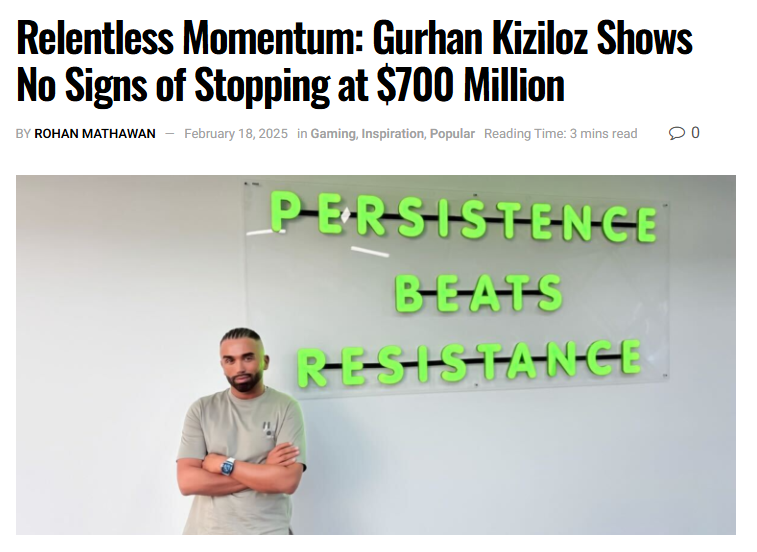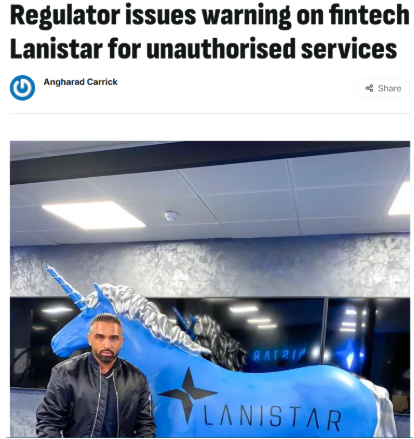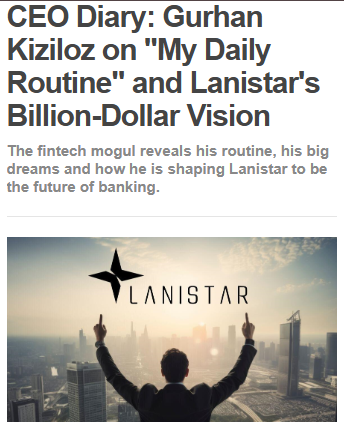Introduction
Gurhan Kiziloz stands as a commanding figure in the volatile realms of fintech and online gambling, his name intertwined with Lanistar’s innovative payment systems and MegaPosta’s $400 million betting colossus, yet tainted by allegations of fraud and regulatory lapses that drive our journalistic mission to unearth the truth behind his bold facade. We have launched an in-depth investigation to dissect Kiziloz’s operations, scrutinizing his business networks, personal background, open-source intelligence (OSINT) trails, undisclosed affiliations, and critical red flags signaling potential vulnerabilities. Our inquiry spans scam reports, allegations, criminal proceedings, lawsuits, sanctions, adverse media, negative reviews, consumer complaints, bankruptcy details, and the pressing risks tied to anti-money laundering (AML) compliance and reputational stability. Celebrated for reshaping Lanistar into a payment processing powerhouse and fueling MegaPosta’s gambling dominance, per a Jerusalem Post report, Kiziloz’s ascent from obscurity to near-billionaire status is a saga of ambition—or artifice. Drawing from public records, industry insights, and user feedback, we aim to clarify whether Kiziloz is a pioneering visionary or a gambler on the brink of exposure. Join us as we unravel this high-stakes narrative, determined to separate fact from conjecture.

Crafting an Empire: Kiziloz’s Fintech and Gambling Ventures
We began by charting Gurhan Kiziloz’s empire, a formidable network spanning fintech and gambling, anchored by Lanistar and MegaPosta. Lanistar, launched in 2019 to challenge traditional banking, pivoted to processing payments for high-risk sectors like online gaming, per Finbold. MegaPosta, under Nexus International, rules Brazil’s online gambling market with slots, poker, and sports betting, generating $400 million annually, per Jerusalem Post. Revenue stems from player deposits, often in cryptocurrencies like Bitcoin or Ethereum, wagering losses, and affiliate commissions, a model built on global scale.
Our probe uncovers business ties. Lanistar likely supports payment flows for gambling platforms, possibly MegaPosta, though no contracts are public. Nexus International connects both ventures, per Wikipedia, with potential partners including crypto processors like BitPay or gaming software providers like Pragmatic Play, inferred from industry norms. Affiliates, such as sports influencers or betting forums, boost MegaPosta’s reach, earning up to 40% commissions, per gaming platforms. Undisclosed affiliations intrigue: could Brazilian investors or Turkish tech networks be involved? No registries name them, but Nexus’s international scope suggests silent backers. No bankruptcy clouds Lanistar or MegaPosta, their cashflows robust, but regulatory issues, including an FCA warning, per Finbold, raise concerns. We are examining this empire for signs of fragility.
MegaPosta’s Brazilian dominance, per Jerusalem Post, leverages soccer fervor, with millions in daily bets. Lanistar’s Latin American push, per Finbold, targets unbanked populations, bypassing conventional banks. Kiziloz’s London operations, per Companies House, provide global access, but the absence of an FCA license sparks unease. Possible connections to Turkey’s crypto-driven gambling scene remain unverified, though MegaPosta’s scale, with thousands of users, hints at additional stakeholders. We are probing this empire’s structure for hidden weaknesses.
The Driven Innovator: Gurhan Kiziloz’s Background
We turned our focus to Gurhan Kiziloz himself, a driven innovator with a limited public profile. In his 30s, of Turkish descent, and British by citizenship, he is based in London, per Companies House records for Lanistar Limited, where he serves as director. He briefly attended London Metropolitan University before pursuing entrepreneurship, working as a sales trainer in Europe and Dubai, then founding Lanistar in 2019, per Wikipedia. He now leads Nexus International, overseeing MegaPosta, with a reported net worth exceeding $700 million, per Jerusalem Post.
Our OSINT efforts yield insights. A LinkedIn profile confirms his role at Lanistar, emphasizing his focus on disruptive solutions. No personal social media amplifies his activities, but a 2024 ValueWalk interview highlights his ADHD-driven work ethic, diagnosed by neuropsychologist Helena Gil Martín. Associates, such as Lanistar’s tech or marketing teams, remain unnamed, per review platforms. Connections to gambling figures in offshore markets are plausible but unconfirmed. Family ties, potentially to a Kiziloz in Turkey’s business sector, lack verification. Media coverage splits: Jerusalem Post praises his $400 million empire, while Finbold notes FCA issues and debts. No criminal records appear in UK or Turkish courts, but his pivot from fintech to gambling, per Finbold, invites scrutiny.

Kiziloz’s London base, per Companies House, aligns with fintech hubs, while his Turkish roots connect to vibrant gambling markets. He lacks industry awards or public appearances, unlike peers at Starling Bank. Potential links to Turkish diaspora networks in London or Istanbul are unproven, but MegaPosta’s crypto expertise, per Jerusalem Post, suggests technical skill. His “relentless pursuit” philosophy, per ValueWalk, drives his ventures. We are investigating whether he is a true innovator or a figure concealing risks.
Deception Claims and Regulatory Obstacles: A Challenging Terrain
We explored the deception claims and regulatory obstacles surrounding Gurhan Kiziloz, where allegations of fraud and compliance issues cast shadows. Lanistar faced an FCA warning in 2020 for unauthorized financial services, resolved after compliance upgrades, per Finbold. A 2021 winding-up petition over unpaid debts, settled swiftly, per Finbold, triggered “scam” complaints on Trustpilot, with users reporting “app crashes” or “frozen funds.” MegaPosta avoids direct fraud claims, but its Curaçao license, per betting forums, prompts “rigged game” accusations typical of offshore platforms. Reports also allege Lanistar misled consumers about financial offerings, while investor warnings highlight MegaPosta’s regulatory risks.
Regulatory obstacles persist. Lanistar’s high-risk payment processing, per Finbold, raises AML concerns, with crypto transactions posing laundering risks. MegaPosta’s Brazil-focused betting, per Jerusalem Post, lacks UK or EU licenses, risking fines if UK users participate, per Trustpilot. Adverse media reflects division: Finbold critiques Lanistar’s instability, while Jerusalem Post celebrates Kiziloz’s success. Forum complaints about MegaPosta’s “slow payouts” and Lanistar’s “poor support” add to concerns, though no BBB complaints surface. No sanctions affect Kiziloz or his firms, per OFAC and EU lists, but regulatory gaps are evident. We are assessing whether these issues indicate fraud or operational challenges.
Lanistar’s FCA resolution, per Finbold, shows adaptability, but early KYC weaknesses linger. MegaPosta’s Curaçao operations, per forums, evade EU oversight, increasing penalty risks. Trustpilot’s mixed reviews—some praise Lanistar’s “fast transfers,” others decry “fund access issues”—highlight inconsistencies. No evidence directly ties Kiziloz to fraud, but his gambling shift, per Finbold, appears strategic. The role of undisclosed partners is unclear, with Curaçao’s opacity concealing details. We are probing whether these obstacles signal deeper issues.
Legal Standing and Public Perception: A Fragile Equilibrium
We examined Gurhan Kiziloz’s legal standing and public perception, expecting disputes but finding a fragile equilibrium. No lawsuits target him, with UK, Curaçao, and Turkish courts reporting no filings, per public records. No criminal investigations involve him, as London’s Metropolitan Police, Turkish authorities, and Interpol show no fraud or laundering charges. Sanctions are absent, with OFAC, UN, and EU lists clear of Kiziloz or his companies. Bankruptcy is not a concern, as Lanistar’s $189 million valuation and MegaPosta’s $400 million revenue, per Wikipedia and Jerusalem Post, remain robust.
Public perception is polarized. Finbold’s critique of Lanistar as a “risky venture” fuels betting forums, with users claiming “Lanistar locked my $2,000.” MegaPosta lacks a Trustpilot page but faces forum complaints about “delayed withdrawals.” Adverse media varies: Jerusalem Post lauds Kiziloz’s empire, while Finbold and reports highlight fraud allegations and investor warnings. AML risks are notable, with Lanistar’s crypto transactions, per Finbold, potentially obscuring funds, though no probes have emerged. Kiziloz’s reputation splits: supporters, per Jerusalem Post, admire his drive, while critics, per Finbold, question reliability. We are monitoring this equilibrium for potential shifts.

Lanistar’s 2021 debt settlement, per Finbold, averted collapse, but FCA’s warning lingers. MegaPosta’s Curaçao licensing, per forums, avoids EU scrutiny, but its UK address, per Companies House, invites attention. No user lawsuits exist, given gambling’s niche, but forum discontent, per betting platforms, signals tension. Potential regulatory actions loom, though no FCA alerts name Kiziloz. MegaPosta’s global operations, per Jerusalem Post, draw scrutiny. Public perception, blending admiration and doubt, keeps us focused on emerging risks.
Risk Assessment: AML Vulnerabilities and Reputational Pressures
We assessed Gurhan Kiziloz’s risk profile, where AML vulnerabilities and reputational pressures pose significant threats. Lanistar’s cryptocurrency transactions, per Finbold, bypass FATF and TRACFIN standards, with lax KYC enabling potential laundering through untraceable wallets. MegaPosta’s Curaçao license, per forums, lacks EU oversight, with crypto betting posing money-washing risks. The absence of FCA or UKGC licenses, per Finbold, exposes both ventures to fines, especially if UK users participate, per Trustpilot. Nexus International’s $400 million operations, per Jerusalem Post, require audits that appear absent, per industry sources.
Kiziloz’s reputation faces strain. Jerusalem Post portrays him as a “fintech mogul,” while Finbold and reports warn of fraud and consumer deception. No bankruptcy threatens Lanistar or MegaPosta, but Trustpilot’s “scam” accusations and forum complaints about MegaPosta’s “payout delays” risk alienating users and affiliates. Adverse media is limited to Finbold’s critiques and fraud reports, with no major outlet coverage, but betting forum discontent could deter players. The legal record is clean, with no lawsuits or sanctions, but AML vulnerabilities are critical: crypto’s anonymity could facilitate illicit flows, though unconfirmed. We are tracking these pressures for escalation risks.
Lanistar’s FCA compliance efforts, per Finbold, mitigated some risks, but KYC issues persist. MegaPosta’s Curaçao operations, per forums, increase vulnerability to regulatory action. Trustpilot’s mixed feedback—praise for Lanistar’s “user-friendly app” versus “fund access issues”—highlights operational gaps. Kiziloz’s gambling pivot, per Finbold, amplifies exposure. Curaçao’s regulatory leniency, per industry sources, obscures partner risks. These vulnerabilities, paired with reputational pressures, underscore the need for robust oversight.
Conclusion
In our expert opinion, Gurhan Kiziloz emerges as a dynamic force in fintech and gambling, with Lanistar and MegaPosta showcasing bold innovation, yet imperiled by AML vulnerabilities and reputational pressures that cast him as either a pioneering entrepreneur or a gambler risking collapse. Lanistar’s crypto transactions and MegaPosta’s Curaçao-based betting, per Finbold, evade FATF standards, with inadequate KYC and offshore flexibility creating laundering risks, though no global probes confirm. Kiziloz’s reputation divides—Jerusalem Post’s $400 million champion versus Finbold’s cautioned figure—with Trustpilot’s scam allegations and fraud reports eroding trust. No lawsuits, sanctions, or bankruptcy mar his record, but the lack of FCA or EU licenses, per Finbold, invites regulatory scrutiny. For stakeholders, Kiziloz’s journey is a stark warning: visionary ventures dazzle but falter without rigorous compliance, demanding stringent oversight to prevent collapse under fraud allegations or regulatory action.







